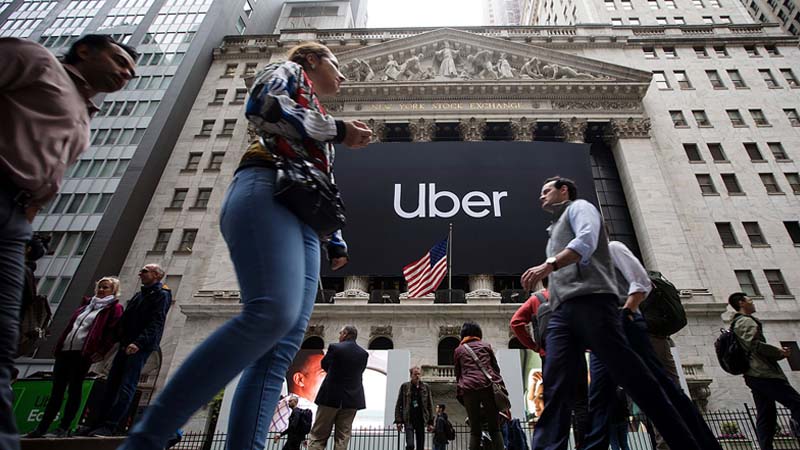Uber slips below $70 billion value
After workers go on strike on the both sides of Atlantic


After the biggest initial public offering of the year, Uber Technologies Inc. ended its first day of trading Friday below its last private valuation.
The deflated debut cast a pall over 2019’s prospects as the hottest year for tech listings this decade -- and potentially on the future of the ride-hailing industry.
It took more than two hours for the stock to finally start trading after Uber executives and drivers congregated at the New York Stock Exchange for the bell-ringing ceremony. The shares debuted at $42, well below the IPO price of $45. A tense wait for those gathered on the trading floor turned into a jittery start for the newly public company, which touched its intraday high and low prices within the first hour of opening.
Uber closed at $41.57, giving it a market capitalization of just $69.7 billion. The San Francisco-based company last raised private capital from Toyota Motor Corp. in August at a valuation of about $76 billion.
Uber CEO Dara Khosrowshahi said in an interview on the floor of the exchange Friday that trade tensions between the U.S. and China played a role in the stock’s weak performance. President Donald Trump had moved overnight to slap fresh tariffs on Chinese goods.
“You can’t pick when you go public,” Khosrowshahi said.
Extended losses
But Uber shares extended losses into the close, even as U.S. equities stabilized on renewed optimism that an all-out trade war could be averted. The tumultuous debut makes Uber the newest member of a stock market club no one would choose to join: Since the start of the decade, just seven other companies that raised more than $1 billion in their IPO have ended the first day of trading in the red.
Uber’s inauguration as a public company was sure to be closely watched by the cavalcade of IPO hopefuls lining up to list in 2019. That crop includes Peloton Interactive Inc., Postmates Inc., Slack Technologies Inc. and WeWork Cos., all of which have preparations in progress to go public this year.
Along with Uber, they’ll be following companies such as rival Lyft Inc., Pinterest Inc. and Beyond Meat Inc. to market. Those three offerings provide a few clues for how public market investors are going to treat unprofitable startups with huge private valuations.
Beyond Meat ended the week 165 percent over its IPO price with a valuation of $4 billion. Pinterest extended gains to close 53 percent above its listing price of $19 a share. Lyft, meanwhile, followed its bigger rival down Friday, almost $21 below where it sold the stock just six weeks ago.
'Broken business model'
Len Sherman, a professor at Columbia Business School, said that while too much attention is paid to trading on day one, Uber has provided enough financial information in the run-up to the IPO for investors to know what they’re buying into.
“The market has reacted negatively to a shared reality that both Lyft and Uber are struggling with a fundamentally broken business model,” he said. “Uber has lost more money faster than any startup in history, with no clear path to profitability.”
Uber’s losses just last year totaled $3.04 billion on an operating basis, with revenue of $11.3 billion. Its total operating losses over the past three years were more than $10 billion, according to filings.
Khosrowshahi said in the interview Friday that while profitability was a priority for the company, public market investors should be judging Uber by a different metric once it starts reporting quarterly earnings. “The most important sort of statistic to look at is bookings, because that reflects essentially what people are paying for the service,” he said.
In distributing the stock, Uber prioritized shareholders -- particularly institutional investors -- that it thinks will hold on to the shares for a long time. “We found a set of investors who are long-term oriented, that believe in our vision,” Khosrowshahi said. “Now we have to execute to make sure that the bet that they made on us is a great bet.”
Uber sold 180 million shares for $45 each Thursday, after marketing them for $44 to $50 apiece. Even at the low end of the price range, Uber’s listing was the ninth-largest U.S. IPO of all time and the biggest on a US exchange since Alibaba Group Holding Ltd.’s $25 billion global record holder in 2014, according to data compiled by Bloomberg.
A market value of less than $70 billion is a considerable climb down from earlier projections: Last year, bankers jockeying to lead the offering told Uber it could be valued at as much as $120 billion in an IPO.
Shares are trading under the ticker UBER. Morgan Stanley, Goldman Sachs Group Inc. and Bank of America Corp. led the listing.
Bloomberg



